THE GOLDEN SILENTS & THE SOUND OF LAUGHTER
Part One
(compiled by R. Warner)
‘The Golden Silents’ was a series of 26 programs, 25 minutes in length,
produced by Richard Evans and broadcast by the BBC in 1969–70 ,
featuring clips from silent comedies, hosted by Michael Bentine
and shown before invited audiences at London’s National Film Theatre.
Clips were provided by Raymond Rohauer and by Mitchell Monkhouse Associates,
a company formed by comedian and script-writer Bob Monkhouse, TV producer Henry Howard and musician Malcolm Mitchell.
This company specialized in TV jingles, later in conference management, and was taken over eventually by Saatchi & Saatchi.
Rohauer got on-screen credit as Film Consultant, Howard as Co-Producer. Mitchell provided the music.
Bentine was an inspired choice as presenter.
A founder member of the ‘Goon Show,’ he later had a wonderfully surreal TV comedy series,
‘It’s A Square World,’ which introduced many ideas later developed by Monty Python.
An erudite ex-Etonian , he introduced each clip with a nice balance, informative and enthusiastic,
but there was no narrative while the clips were playing, just music and live audience laughter.
The show was very popular.
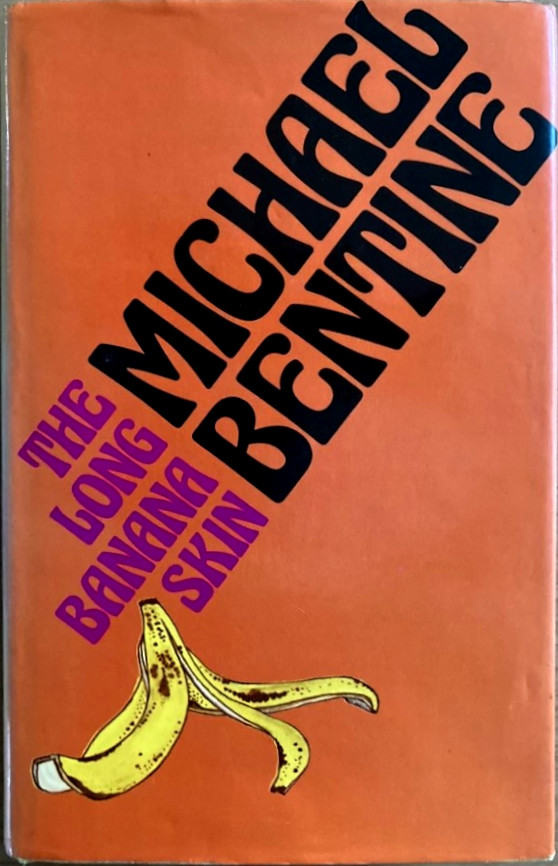
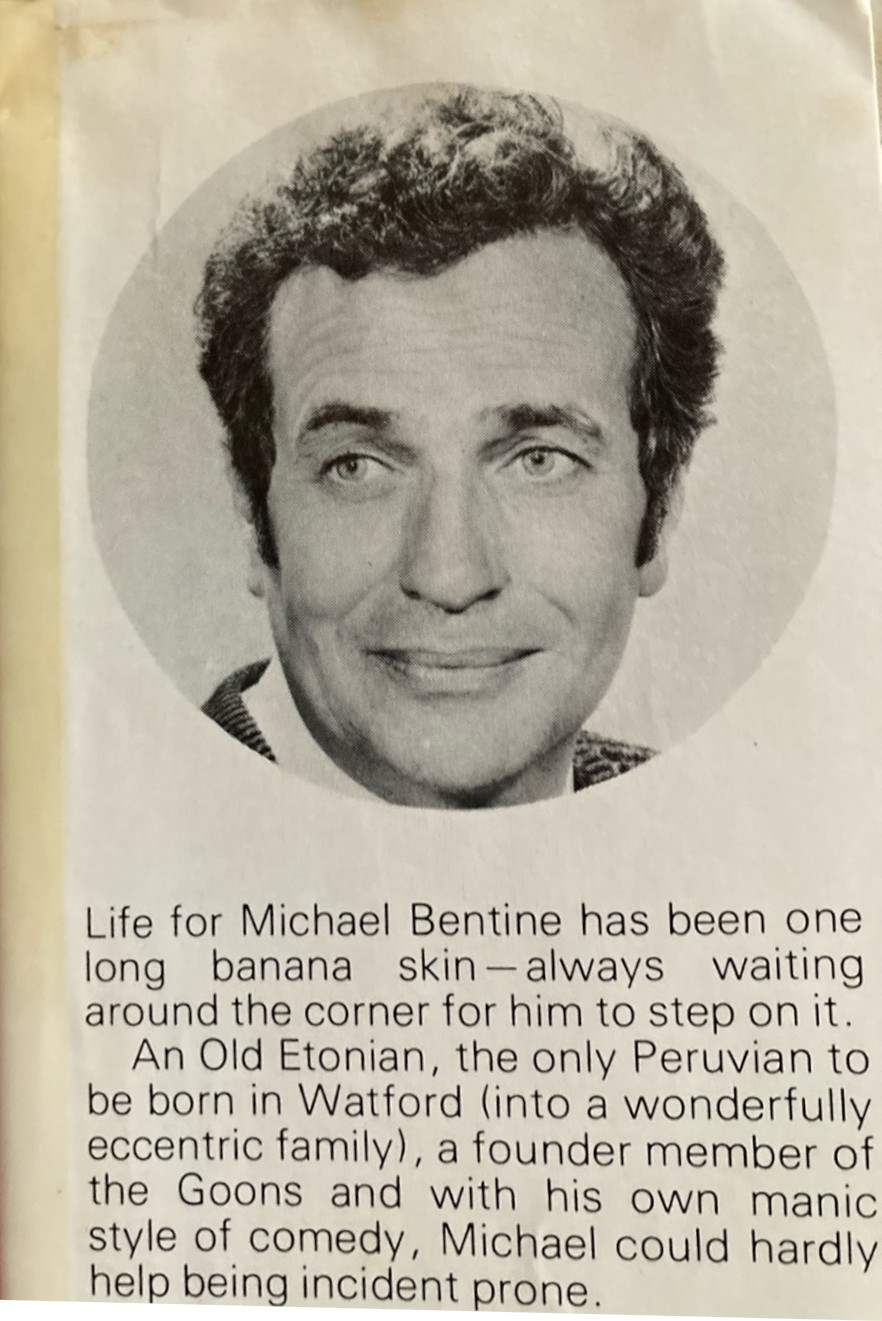
In his autobiography, Michael Bentine described how the show came together and gave some valuable background to the filming of the series:
|
...I was touring the northern clubs when I got a call from Michael Mills asking me to meet him and Tom Sloan,
the next day at the BBC Television Centre.
This meant flying down from Newcastle, first thing in the morning, and catching a plane back, to make the show that night.
But...
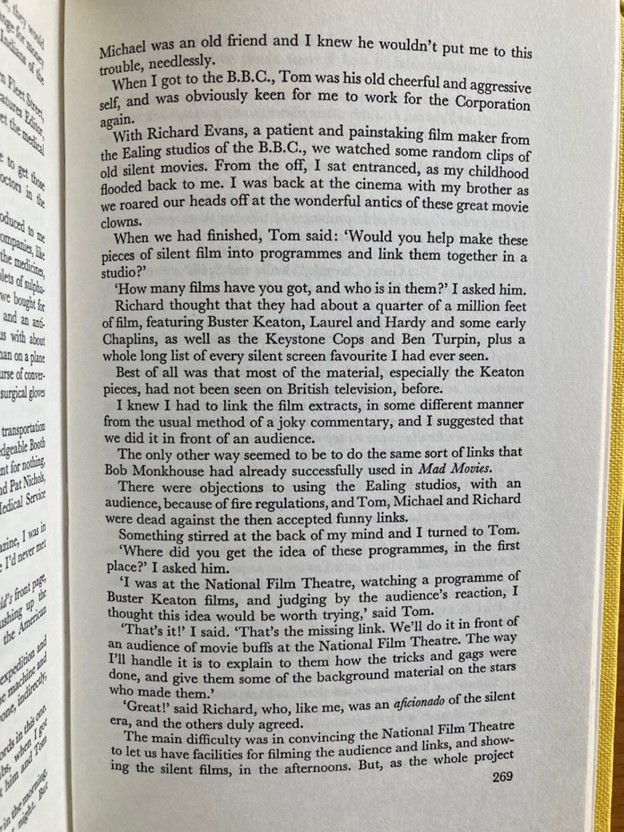 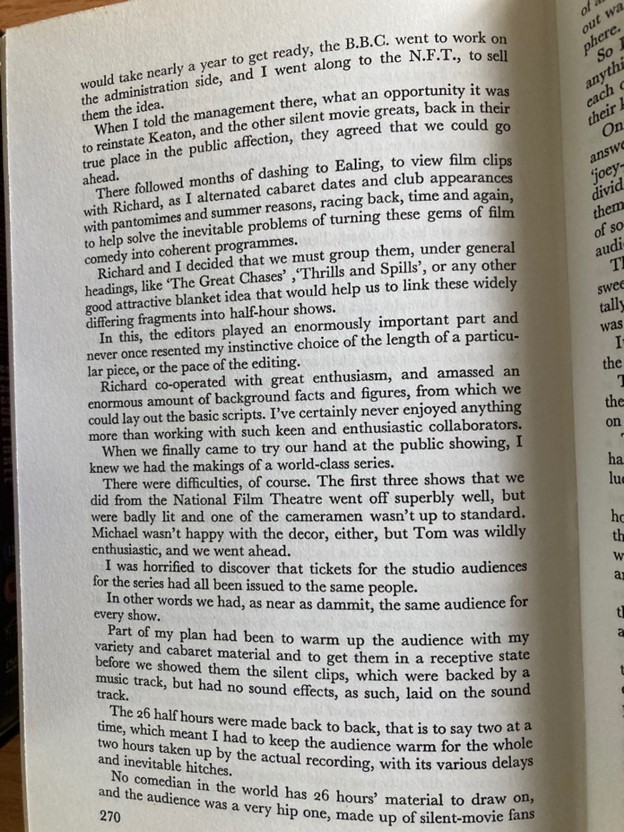 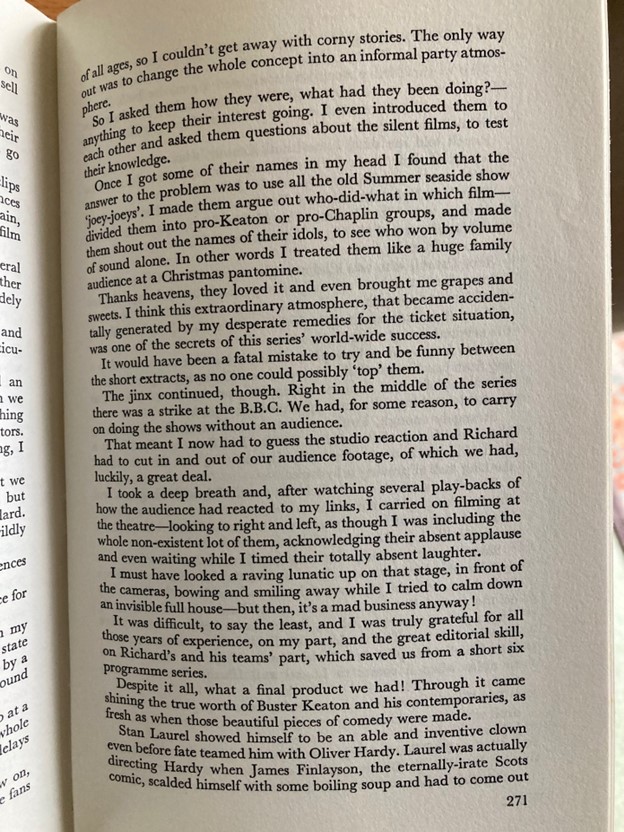 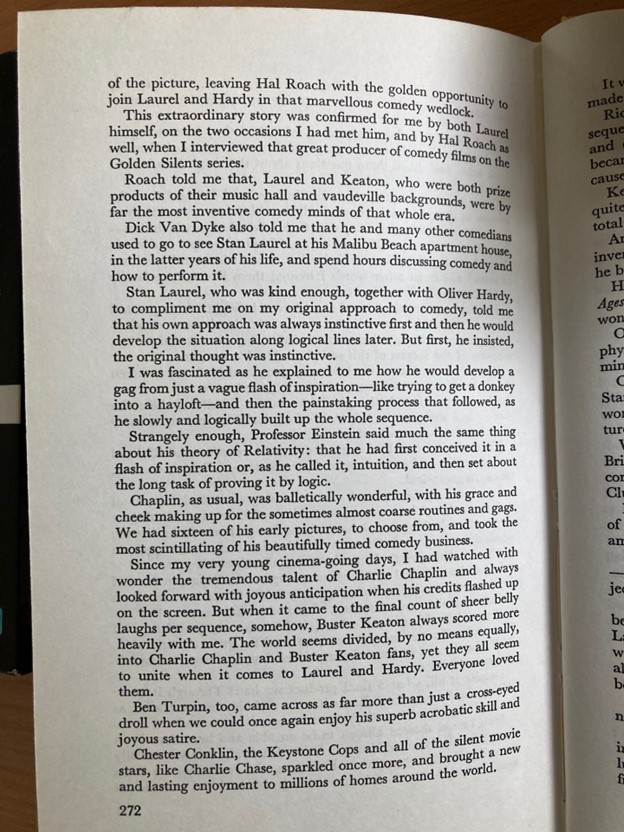 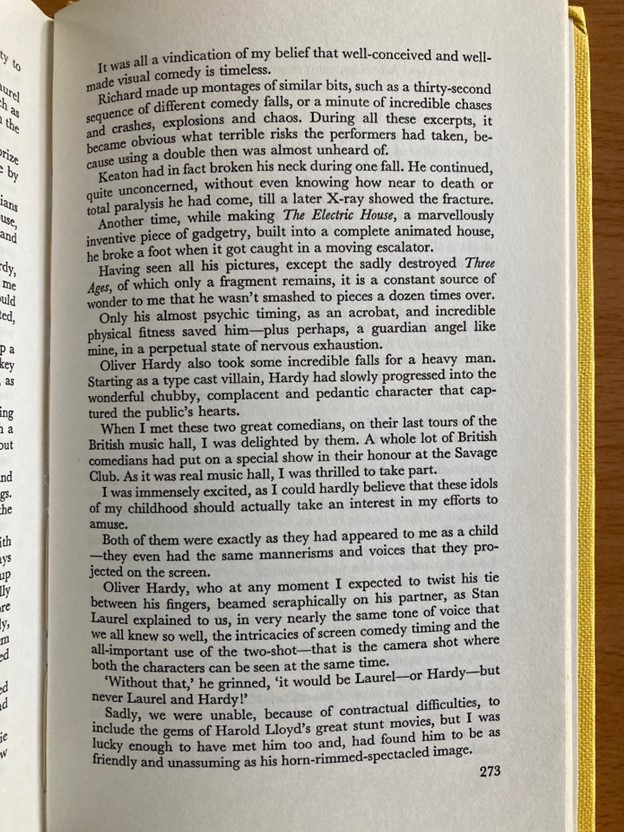 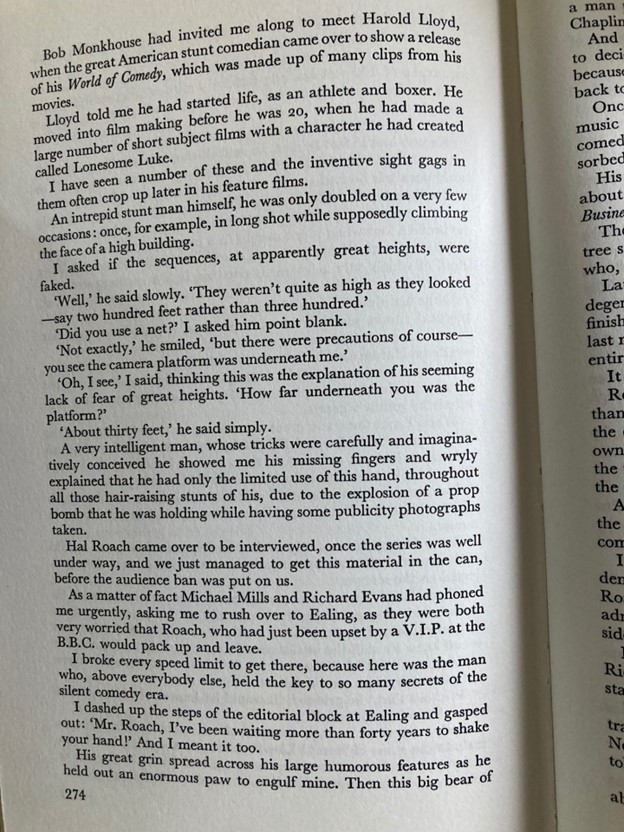 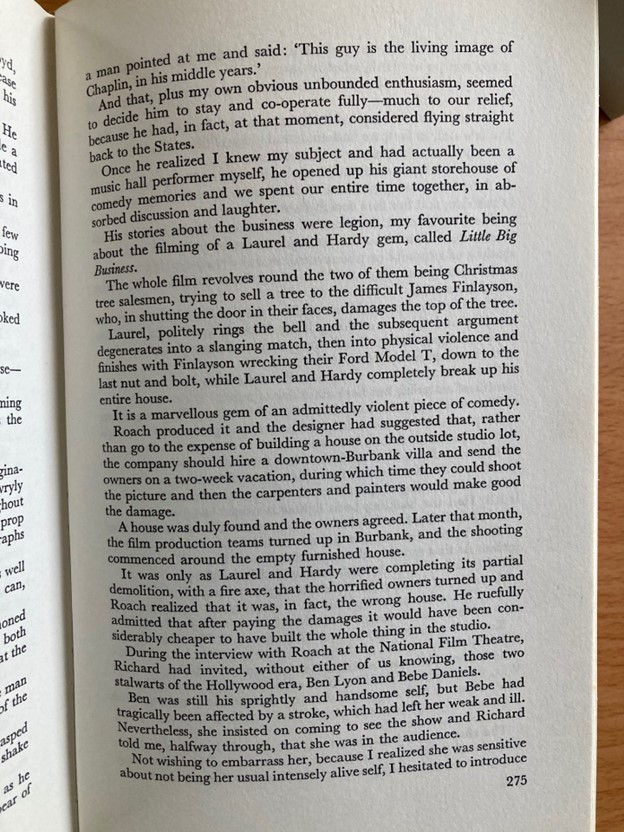 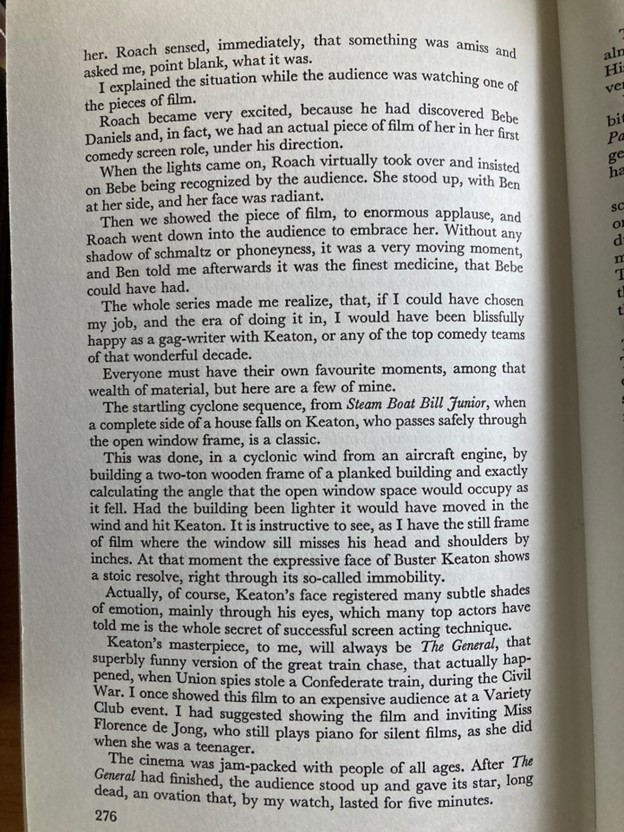 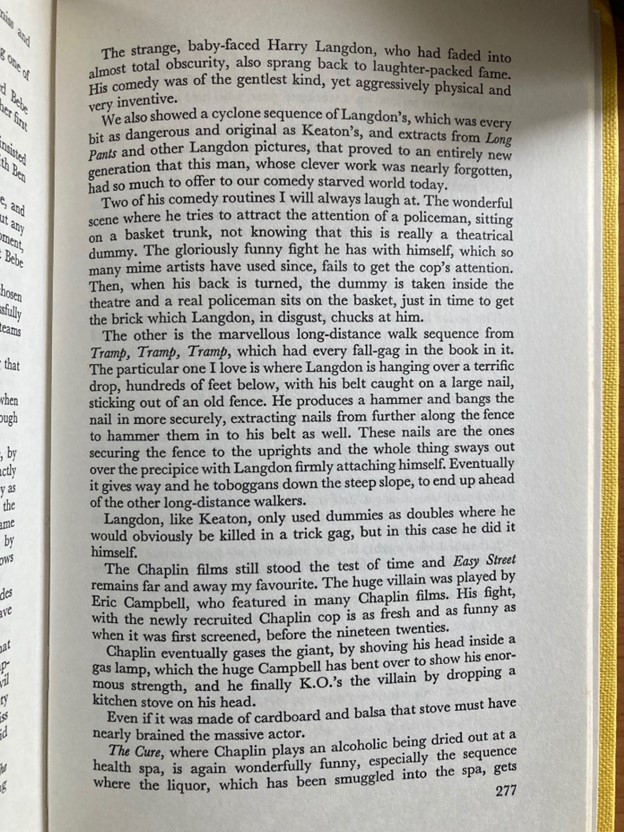 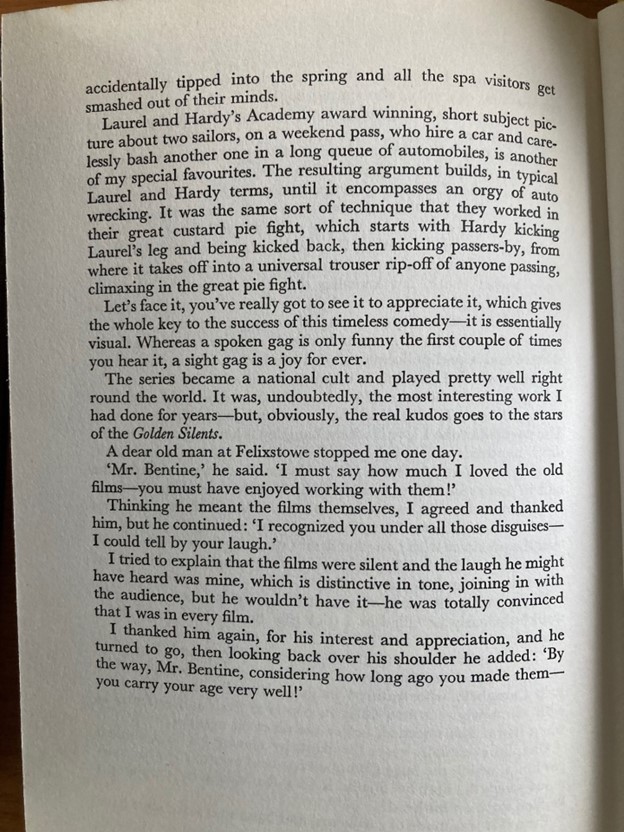 |
These were the 26 shows and the 27 first dates of screening (one show was repeated during the run):
Episode One: MEET THE CAST Friday September 12th, 1969. BBC One 20:25
(All subsequent episodes went out on Fridays at the same time of 20:25 on BBC One)
The stars of the silent comedy screen
Introduced by Michael Bentine from the National Film Theatre, London
A look at the main comedians whose films will be featured in the series
Buster Keaton, Harold Lloyd, Harry Langdon, Stan Laurel, Laurel and Hardy, Charlie Chaplin
A BBC TV production in association with Mitchell Monkhouse Associates and Raymond Rohauer
A BBC TV production in association with Mitchell Monkhouse Associates and Raymond Rohauer
| Contributors | |
| Presenter/script: | Michael Bentine |
| Script/producer: | Richard Evans |
| Film Consultant: | Raymond Rohauer |
| Music composed by: | Malcolm Mitchell |
| Co-Producer: | Henry Howard |
| (These credits remained the same for all episodes) | |
Episode Two: THE GREAT STONE FACE September 19th, 1969
This week we concentrate on Buster Keaton, perhaps the most inventive of all the silent film comedians and look at four of his finest films.
Episode Three: YOU CAN’T WIN ’EM ALL September 26th, 1969
Some comedians, like the baby-faced Harry Langdon, are eternal losers. Some, like Charlie Chaplin, are natural winners.
If Buster Keaton wins through, it’s usually against fearful odds.
Episode Four: A MATTER OF TIMING October 3rd, 1969
This program takes a look at the art that every great comedian must possess - the art of timing —
with scenes from the films of Buster Keaton, Harry Langdon, Charlie Chaplin, and The Keystone Cops.
Episode Five: MOUSTACHE YOU TO TAKE OFF THAT MOUSTACHE October 10th, 1969
Most silent film comedians had a trademark and very often it was a moustache (or ‘mo’ as it was called) or a beard.
Tonight’s program includes Charlie Chaplin, W. C. Fields, Harry Langdon, Buster Keaton and Billy Bevan.
Episode Six: SAME AGAIN PLEASE October 17th, 1969
A look at the ways in which some comedians tackle the same situation - with Buster Keaton, Charlie Chaplin, and Harry Langdon.
Episode Seven: A TRIBUTE TO HAL ROACH October 24th, 1969
Michael Bentine talks to the famous film producer Hal Roach about some of the stars he discovered
(including Harold Lloyd, Laurel and Hardy, and Charlie Chase) and introduces scenes from some of his films.
Episode Eight: BRING ON THE GIRLS October 31st, 1969
Everybody has an eye for a pretty girl, and the silent film comedians were no exception,
as can be seen in this week’s excerpts from the films of Buster Keaton, Charlie Chaplin, and Harry Langdon.
Episode Nine: EXIT PURSUED BY BEAR November 7th, 1969
A Shakespearean title which introduces a series of hectic chase sequences,
featuring Larry Semon, Buster Keaton, Harry Langdon, Ben Turpin and Charlie Chaplin.
The chase is one of the basic ingredients of all silent comedy films.
In tonight’s programme Buster Keaton chases a girl on an ocean liner,
Ben Turpin is chased by a sheriff’s posse, Harry Langdon chases himself.
Charlie Chaplin and Buster Keaton are both chased by the cops.
And there’s always the Keystone Cops...
Episode Ten: TRICKS OF THE TRADE November 14th, 1969
The brilliant acrobatic talents of Buster Keaton and Harry Langdon are combined with some unusual trick camera work
in this week’s program, which also includes an early Walt Disney cartoon.
Episode Eleven: JUST A CRUMB FROM THE SPONGECAKE OF LIFE November 21st, 1969
A favorite role of the silent film comedians was that of the down-trodden little man always being buffeted by fate.
Harry Langdon, Ben Turpin, Charlie Chaplin and Buster Keaton (above) provide some typical examples.
Episode Twelve: A MAN’S BEST FRIEND November 28th, 1969
Animals of all shapes and sizes are a feature of this week’s program,
which includes films of Buster Keaton, Harry Langdon, Stan Laurel and Walt Disney.
Episode Thirteen: A MAN OF PROPERTY December 5th, 1969
The second of four programs which look at the artists made famous by film producer Hal Roach
including Harold Lloyd, Stan Laurel and Charlie Chase.
Episode Fourteen: MESSING ABOUT IN BOATS December 12th, 1969
It’s a strange coincidence that many of the silent film comedians were fascinated by boats,
and this week Michael Bentine looks at some typical examples from the films of Buster Keaton, Charlie Chaplin and Harry Langdon.
Episode Fifteen: COPS AND ROBBERS December 19th, 1969
Buster Keaton battles with convicts and runs away from cops; Stan Laurel as a Mountie sets out to get his man;
Charlie Chaplin joins the police force and Harry Langdon meets a policeman who is not really there.
(No show December 26th due to Christmas scheduling)
Episode Sixteen: THE FEMALE OF THE SPECIES January 2nd, 1970
In most silent comedy films the women were either helpless heroines waiting to be rescued
or domineering ogres who bullied their hapless menfolk.
Tonight, Michael Bentine looks at both types, with Buster Keaton, Harry Langdon, Larry Semon, and Charlie Chaplin.
Episode Seventeen: MORE TRICKS OF THE TRADE January 9th, 1970
Once again, a look at some more of the tricks that these silent film comedians learnt in their early vaudeville training,
plus some of the camera tricks they invented during their film careers.
Buster Keaton, Larry Semon, Harry Langdon, Charlie Chaplin, and Ben Turpin provide examples.
Episode Eighteen: THE FALL GUYS January 16th, 1970
Nearly all the silent film comedians came from music-hall, and many were acrobats.
They often played the part of the eternal loser, the sucker.
So, they truly were ‘fall guys’ in both senses of the term, as Larry Semon, Buster Keaton, Harry Langdon, and Stan Laurel demonstrate.
Episode Nineteen: ONE BORN EVERY MINUTE January 23rd, 1970
This program takes another look at the work of some of the comedians made famous by producer Hal Roach
including Harold Lloyd, Laurel and Hardy and Charlie Chase.
Episode Twenty: LITTLE ACORNS January 30th, 1970
Great oaks from little acorns grow’ so the saying goes and, in this program,
we look at the ‘little acorns’ (the very first films) of Charlie Chaplin, Harry Langdon, and Buster Keaton,
and contrast them with scenes from their later films.
Episode Twenty-One: IT’S PARODY TIME February 6th, 1970
All the silent film comedians were great mickey-takers.
In this program Ben Turpin and Stan Laurel parody Rudolph Valentino;
Buster Keaton parodies a Western actor, William S. Hart;
and Chaplin provides his own version of ‘Carmen.’
Episode Twenty-Two: CURIOUSER AND CURIOUSER February 13th, 1970
Each film in this program is a curiosity.
A collection of unusual films including the first film in which Laurel played a scene with Hardy;
Chaplin’s propaganda film in wartime; a famous Chaplin imitator Billy West,
and Harry Langdon and Buster Keaton are also seen in unusual roles.
Episode Twenty-Three: THE SPORTING LIFE February 20th, 1970
Many silent film comedians were not only acrobats but also good athletes.
This program looks at the sporting prowess of Buster Keaton, Charlie Chaplin, Stan Laurel and Harry Langdon.
Episode Twenty-Four TRICKIER AND TRICKIER February 27th, 1970
Another program which features some of the tricks of the trade which many comics had learnt on the vaudeville stage and taken over to the films.
Examples are provided by Buster Keaton, Harry Langdon, and Larry Semon.
Episode Twenty-Five THRILLS AND SPILLS March 6th, 1970
The last of the four programs in which we look at some of the comedians made famous
by producer Hal Roach including Stan Laurel, Charlie Chase, and Harold Lloyd
Harold Lloyd made the astonishing total of over 300 films.
He did all his own stunts, including his famous and terrifying sky-scraper walking.
To add to the danger his right hand was permanently damaged when a studio bomb blew up.
Stan Laurel was English and learnt his trade in the same music-hall troupe as Charlie Chaplin.
He switched from acting to directing and only went back when another performer scalded his arm.
Playing opposite him was a ‘heavy’ called ‘Babe’ Hardy, which is how the team of Laurel and Hardy began.
In-Series Repeat of
Episode Three: YOU CAN’T WIN ’EM ALL March 13th, 1970
Another look at one of the earlier programs featuring Harry Langdon as the eternal loser,
Charlie Chaplin as the inevitable winner and Buster Keaton trying to follow Chaplin’s example.
Episode Twenty-Six: WHERE WE CAME IN March 20th, 1970
The last program in the series which takes a final look at some of the great comedians of the era
including Stan Laurel, Harry Langdon, Chaplin, Larry Semon, and the one and only Buster Keaton.
Subsequently, there were repeats, two further 25-minute specials devoted to Mack Sennett,
and seven longer Buster Keaton and Harry Langdon specials. These will be covered later.
THE GOLDEN SILENTS & THE SOUND OF LAUGHTER
(Part Two)
Before we get to the repeats and specials, here are details of the first thirteen programs to be recorded,
as listed in the April-May 1969 NFT brochure:
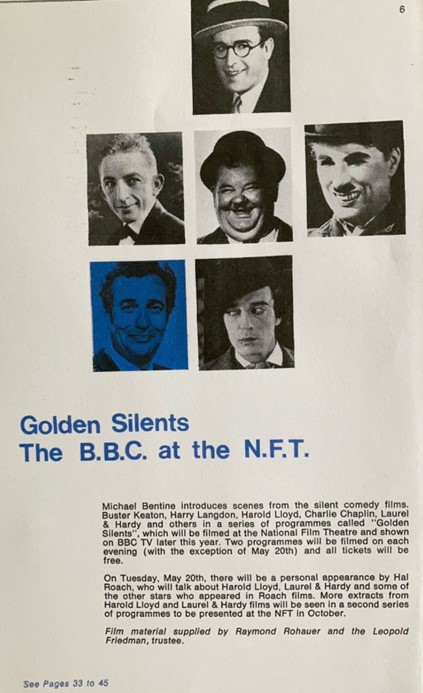
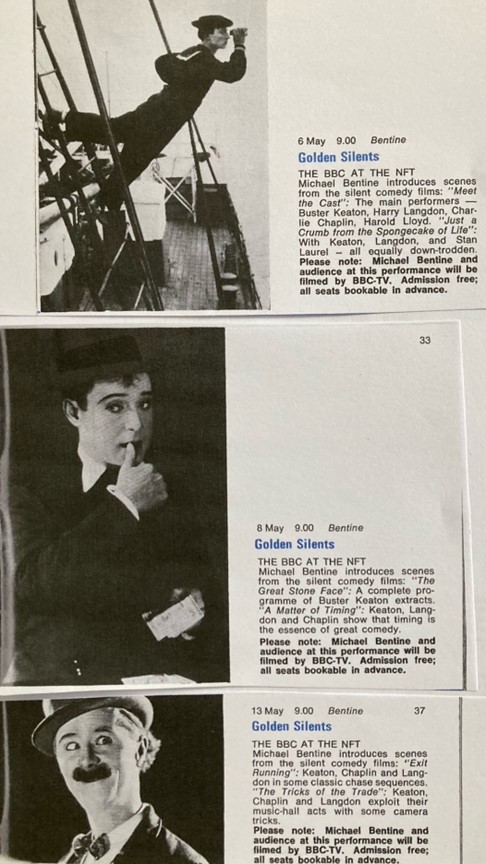
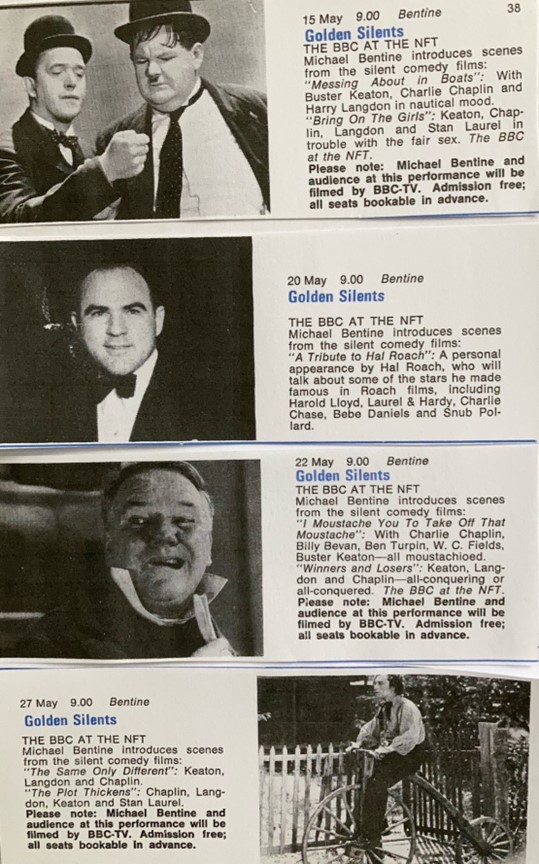
The show’s theme tune was issued on a single...
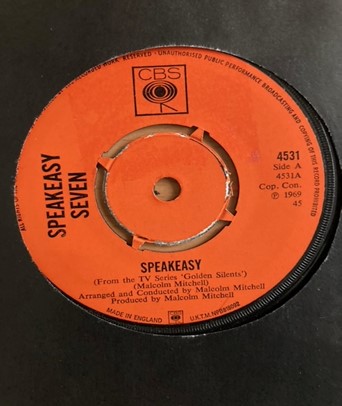
...and can be heard here:
bondbrookebond, The Golden Silents Tv Theme * Speakeasy Seven * Speakeasy, posted on Mar 19, 2024
When YouTube disappears this video, download it.
GOLDEN SILENTS REPEATS & SPECIALS
(note: all dates are from London Region listings. Regional variances such as BBC Wales are not covered)
(note: all dates are from London Region listings. Regional variances such as BBC Wales are not covered)
1970 REPEATS, Sunday Afternoons:
MEET THE CAST 9/20
THE GREAT STONE FACE 9/27
EXIT PURSUED BY BEAR 10/4
A MATTER OF TIMING 10/11
JUST A CRUMB.... 10/18
MEN OF PROPERTY 10/25
TRICKS OF THE TRADE 11/1
SAME AGAIN PLEASE 11/15
MOUSTACHE... 11/22
YOU CAN’T WIN ’EM ALL 1
1/22 BRING ON THE GIRLS 12/6
A MAN’S BEST FRIEND 12/20
MEET THE CAST 9/20
THE GREAT STONE FACE 9/27
EXIT PURSUED BY BEAR 10/4
A MATTER OF TIMING 10/11
JUST A CRUMB.... 10/18
MEN OF PROPERTY 10/25
TRICKS OF THE TRADE 11/1
SAME AGAIN PLEASE 11/15
MOUSTACHE... 11/22
YOU CAN’T WIN ’EM ALL 1
1/22 BRING ON THE GIRLS 12/6
A MAN’S BEST FRIEND 12/20
These were followed by two newly recorded 25-minute specials:
THE KING OF COMEDY 1: MACK THE KNIFE Sunday December 27th, 1970, 14:35
The first of two special programs on Mack Sennett
Introduced by Michael Bentine from the National Film Theatre.
Mack Sennett was the greatest of the silent slapstick comedy producers.
The comedians featured in this program include The Keystone Cops, Fatty Arbuckle, Ford Sterling,
Chester Conklin, Charlie Chaplin, and Mack Sennett himself.
A BBC TV production with Mitchell Monkhouse Associates and Raymond Rohauer.
THE KING OF COMEDY 2: ON THE RUN Monday December 28th, 1970, 12:40
The second of two special programs on Mack Sennett
Introduced by Michael Bentine from the National Film Theatre.
A further look at some of the star comedians from the Mack Sennett studios,
including Ben Turpin, Billy Bevan, Mabel Normand, Bobby Vernon, Harry Langdon, Ford Sterling and Mack Sennett.
A BBC TV production with Mitchell Monkhouse Associates and Raymond Rohauer.
1971 REPEATS, Sunday Afternoons:
THRILLS AND SPILLS 3/14
MESSING ABOUT IN BOATS 4/4
THE FEMALE OF THE SPECIES 4/18
COPS AND ROBBERS 4/25
MORE TRICKS OF THE TRADE 5/2
CURIOUSER & CURIOUSER 5/9
LITTLE ACORNS 5/16
THE SPORTING LIFE 6/6
TRICKIER AND TRICKIER 6/13
MACK THE KNIFE 6/20
THRILLS AND SPILLS 3/14
MESSING ABOUT IN BOATS 4/4
THE FEMALE OF THE SPECIES 4/18
COPS AND ROBBERS 4/25
MORE TRICKS OF THE TRADE 5/2
CURIOUSER & CURIOUSER 5/9
LITTLE ACORNS 5/16
THE SPORTING LIFE 6/6
TRICKIER AND TRICKIER 6/13
MACK THE KNIFE 6/20
The ‘Golden Silents’ sister series, ‘The Sound of Laughter,’ began transmission in September 1971.
The third part of these notes will cover this series.
CHRISTMAS 1971 — one repeat and a Golden Silents Special:
ON THE RUN Monday December 27th, 1971, 09:15
THE GENERAL Tuesday December 28th, 1971, 12:00 to 13:10
A special presentation of one of the screen’s classic comedy films.
Introduced by Michael Bentine from the National Film Theatre.
A BBC TV presentation in association with Raymond Rohauer.
ON THE RUN Monday December 27th, 1971, 09:15
THE GENERAL Tuesday December 28th, 1971, 12:00 to 13:10
A special presentation of one of the screen’s classic comedy films.
Introduced by Michael Bentine from the National Film Theatre.
A BBC TV presentation in association with Raymond Rohauer.
| Contributors | |
| Presenter/script: | Michael Bentine |
| Music: | Malcolm Mitchell |
| Producer: | Richard Evans |
1972 REPEATS — TWO SHOWS ONLY, 18:50 on Tuesdays:
PARODY TIME 8/8
THE FALL GUYS 8/15
PARODY TIME 8/8
THE FALL GUYS 8/15
Sometime in 1972 or 1973, I noticed a small BBC announcement on the noticeboard at the NFT.
There would be ‘Golden Silents’ feature film presentations with Bentine at the NFT.
Apply for free tickets!
The features: Steamboat Bill, Jr.; Our Hospitality; College; The Navigator;
Tramp, Tramp, Tramp; The Strong Man.
Underneath, someone had scribbled a note to the effect that true film fans shouldn’t bother.
The films would probably be cut “like
the Christmas showing of The General” and accompanied by that “awful Golden Silents music”.
Undeterred, I decided to go.
The only one I could make was College, so I sent off for my free ticket.
A chance to see how the shows were filmed, a chance to hear the Mitchell music over the NFT’s superior sound system
(I figured it was pre-recorded), a chance to see College again
(I’d seen it less than the other Keaton features),
a chance to see Michael Bentine and maybe speak to him!
I went, but I didn’t see any BBC cameras, I didn’t hear any music, I never saw Bentine, and I didn’t even see College!
Producer Richard Evans came out on stage and informed us that Bentine had already recorded his part at an earlier show.
He said that regulars would know this already, but for newbies, there would be no music.
The film would be shown silent, our laughter recorded, and the music added later.
Finally, he announced that there had been a change of plan.
The BBC would not be screening College.
Instead, we would be seeing Sherlock Jr., and, because of its brevity, also Cops.
When asked why there had been a change, he said the team had finally decided on Sherlock Jr.,
despite its short running time, because it was superior to College.
Several audience members complained, saying they had turned up especially to see College,
which they had not seen before. Evans told them to see him afterwards,
and he would arrange a special screening of College for them at the BBC.
Sherlock Jr. was a print with re-made Rohauer titles. Cops had original titles.
I watched the whole series of six on TV.
All the longer films, except for Sherlock Jr., had original titles.
They were edited in some cases, but it was sensibly done:
STEAMBOAT BILL JR Saturday July 28th, 1973
Starring Buster Keaton
The first presentation in a season of classic silent comedy films.
Introduced by Michael Bentine from the National Film Theatre, London.
The first presentation in a season of classic silent comedy films.
Introduced by Michael Bentine from the National Film Theatre, London.
OUR HOSPITALITY Saturday August 4th, 1973
Starring Buster Keaton
The second presentation in a season of classic silent comedy films.
Introduced by Michael Bentine from the National Film Theatre, London
The second presentation in a season of classic silent comedy films.
Introduced by Michael Bentine from the National Film Theatre, London
SHERLOCK JR & COPS
Starring Buster Keaton
Third presentation in a season of classic silent comedy films.
Introduced by Michael Bentine from the National Film Theatre
Third presentation in a season of classic silent comedy films.
Introduced by Michael Bentine from the National Film Theatre
THE NAVIGATOR
Starring Buster Keaton
The fourth in a season of classic silent comedy films.
One of Keaton's finest films which features the largest 'prop' he ever used - a real ocean-going liner. Introduced by Michael Bentine from the National Film Theatre
The fourth in a season of classic silent comedy films.
One of Keaton's finest films which features the largest 'prop' he ever used - a real ocean-going liner. Introduced by Michael Bentine from the National Film Theatre
TRAMP TRAMP TRAMP
Starring Harry Langdon
The fifth presentation in a season of classic silent comedy films.
Baby-faced Harry Langdon enters a cross-country walking marathon to win the hand of his ladylove, Joan Crawford.
Introduced by Michael Bentine from the National Film Theatre, London
THE STRONG MAN
Starring Harry Langdon
The sixth presentation in a season of classic silent comedy films.
Harry Langdon as a strong-man’s assistant hilariously trying to find his wartime ladylove.
Introduced by Michael Bentine from the National Film Theatre, London
1973 REPEATS
“Fillers” for the Saturday morning schedules, these went out at 09:35 and were the last time any of the Golden Silents were shown on British TV. The feature-length specials were never repeated.
MEET THE CAST 9/29
THE GREAT STONE FACE 10/6
TRICKS OF THE TRADE 10/13
YOU CAN’T WIN ’EM ALL 10/20
MESSING ABOUT IN BOATS 10/27
TRICKIER AND TRICKIER 11/3
LITTLE ACORNS 11/10
“Fillers” for the Saturday morning schedules, these went out at 09:35 and were the last time any of the Golden Silents were shown on British TV. The feature-length specials were never repeated.
MEET THE CAST 9/29
THE GREAT STONE FACE 10/6
TRICKS OF THE TRADE 10/13
YOU CAN’T WIN ’EM ALL 10/20
MESSING ABOUT IN BOATS 10/27
TRICKIER AND TRICKIER 11/3
LITTLE ACORNS 11/10
THE GOLDEN SILENTS & THE SOUND OF LAUGHTER
(Part Three)
A few additional bits and pieces about ‘The Golden Silents’:
A page from the September–December 1969 NFT brochure:
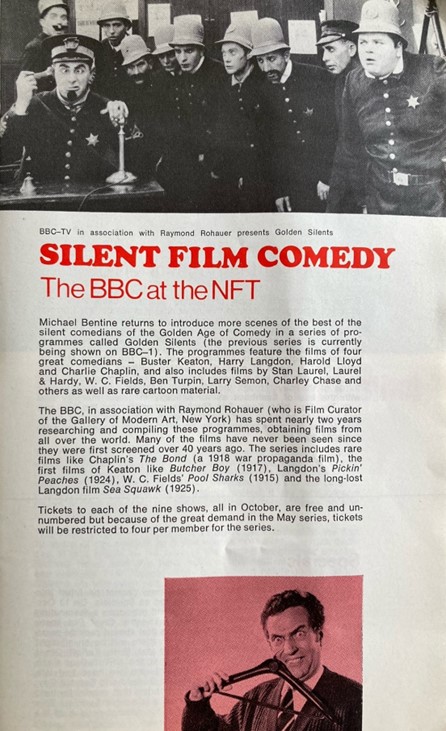
The nine shows all started at 9pm, and the calendar showed the usual stock photos for each date, with identical wording:
Michael Bentine will introduce scenes from great silent comedy films.
The individual programs cannot be announced in advance but will include selections
from the funniest work of Keaton, Chaplin, Lloyd, Langdon, Laurel and Hardy, Ben Turpin and Larry Semon.
Please note: Michael Bentine and the audience at this performance will be filmed by BBC TV.
Admission free; all seats bookable in advance.
Dates, all in October 1969, were 2nd, 6th, 9th, 13th, 16th, 20th, 23rd, 27th, 30th.
Since it had taken seven shows to record thirteen episodes in the earlier filming batch,
nine shows for the remaining thirteen episodes seems too much.
Perhaps they also did the two Mack Sennett Specials and The General on these dates.
Somewhere, I read that Raymond Rohauer sat in the projection room while the episodes were being filmed,
timing his clips so he knew exactly how much to charge the BBC.
Having seen nearly all the films sampled in the show many times,
it’s hard to remember the content, but three clips stuck in my mind:
THE FROZEN NORTH
They screened the cabin sequence where Keaton uses his arm to replace the broken door slat.
I held on to this memory for years, because this film was never shown in the Academy seasons.
THE SEA SQUAWK
Bentine announced that, during the preparations for the series,
a friend of Richard Evans in Europe had sent them a substantial chunk of footage from an unknown Harry Langdon film.
“We sent it to our film consultant, Ray Rohauer, in the States, and he identified it as The Sea Squawk.”
He may have said “in the Netherlands” rather than Europe.
He definitely said “Ray”, not “Raymond”.
DR. PICKLE & MR PRYDE
I thought the Stan Laurel clip was hilarious, and didn’t encounter the film again until 2005.
THE SOUND OF LAUGHTER
Between the second series of Golden Silents repeats and the 1971 screening of The General,
BBC One viewers were treated to a new series devoted to talkie comedies.
Raymond Rohauer supplied American material for seven of the sixteen shows.
The others were of British material sourced elsewhere.
Nevertheless, Rohauer wangled himself a Film Consultant credit on all the shows.
Once again, the shows were presented in front of audiences at the NFT.
This time, the smaller NFT2 auditorium was used. The presenter was comedy writer Frank Muir.
Whereas Michael Bentine stood for his enthusiastic announcements, Muir sat cross-legged in a chair
and adopted a more intimate style.
He seemed happy presenting the likes of W.C. Fields and the Marx Brothers,
but sometimes came across as a bit uncomfortable with some of the more basic British comedy clips.
It was an enjoyable show, but it failed to score a hit with TV audiences on the scale of ‘The Golden Silents’.
The regional BBC 1 channels (Scotland, Wales) dropped the show after a few weeks and replaced it with their own fare.
Whereas Michael Bentine devoted a whole chapter to ‘The Golden Silents’
in his autobiography, Frank Muir failed to mention ‘The Sound of Laughter’ at all in his:
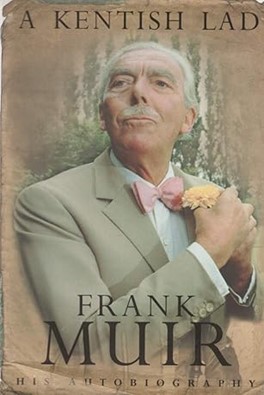
Why was this? Well, many of the British clips were from very familiar films,
and Rohauer hardly had the best of American sound comedy at his command, apart from the Fields shorts.
All Laurel & Hardy clips came from The Flying Deuces.
All Marx Brothers clips came from A Night in Casablanca.
I was unaware that Rohauer ever claimed ownership of these.
Perhaps, like the British clips, Richard Evans got them from a different source.
I remember a clip from Keaton’s The Gold Ghost being shown,
and Frank Muir describing The Fatal Glass of Beer as “the best clip in the whole series”.
The theme music was Harry Roy’s recording of ‘Casa Loma Stomp’, issued originally on this 1934 78...
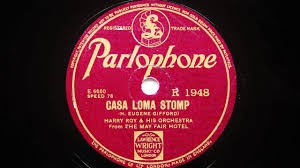
...but probably picked up by Evans from a current LP reissue:
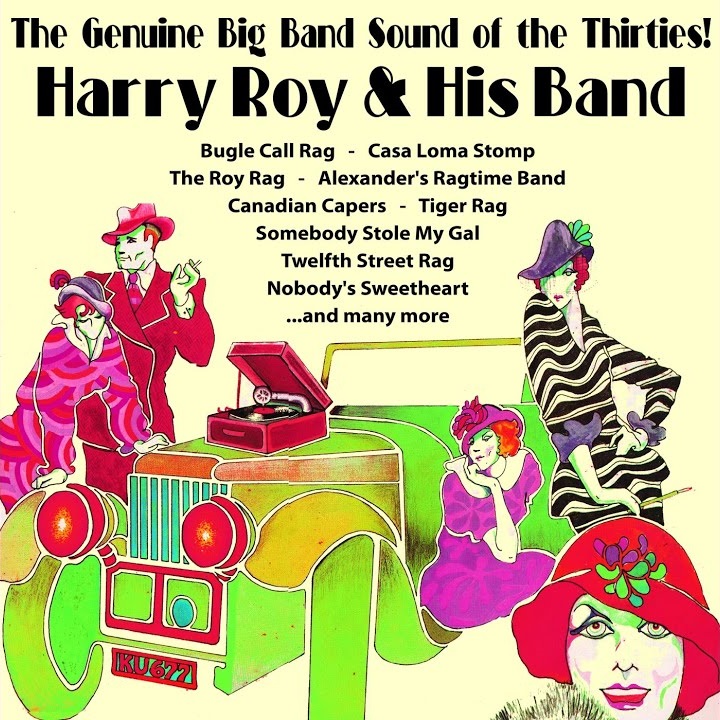
It can be heard here:
Harry Roy & His Band - Topic, Casa Loma Stomp, posted on Jul 27, 2016
When YouTube disappears this video, download it.
Because the Radio Times “contributors” listings vary for this series, they are shown in full:
EPISODE ONE: Curtain Up. Friday September 17th, 1971. BBC One, 20:30
Scenes from the early comedy talkies introduced by Frank Muir from the National Film Theatre, London
In which we take a first look at some of the top names in British comedy films of the 1930s and 40s,
including George Formby, Gracie Fields, Will Hay, Sonnie Hale and Claude Hulbert.
Films by courtesy of EMI Elstree Studios Ltd., and the National Film Archive
| Contributors | |
| Presenter/Script: | Frank Muir |
| Film Consultant/Associate Producer: | Raymond Rohauer |
| Producer: | Richard Evans |
EPISODE TWO: America, America. Friday September 24th, 1971. BBC One, 20:30
Introduced by Frank Muir
American comedy stars, with Burns and Allen, Eddie Cantor, W.C. Fields, Robert Benchley
A BBC production in association with Raymond Rohauer
| Contributors | |
| Presenter/Script: | Frank Muir |
| Film Consultant: | Raymond Rohauer |
| Producer: | Richard Evans |
EPISODE THREE: The Under-Dogs. Friday October 1st, 1971. BBC One, 20:30
Scenes from the early comedy talkies introduced by Frank Muir From the National Film Theatre
With Tommy Trinder, Claude Hulbert, Stanley Lupino, Bobby Howes, and George Formby.
Films by courtesy of EMI Elstree Studios Ltd, and National Film Archive
| Contributors | |
| Presenter/Script: | Frank Muir |
| Film Consultant/Associate Producer: | Raymond Rohauer |
| Producer: | Richard Evans |
EPISODE FOUR: Hawks and Doves. Friday October 8th, 1971. BBC One, 20:30
Scenes from the early comedy talkies introduced by Frank Muir from the National Film Theatre, London
American comedy can be brash, or it can be smooth, hawkish or doveish.
In this programme, the hawks are The Marx Brothers, Bob Hope, and The Ritz Brothers.
The doves are Bing Crosby and Robert Benchley.
(A BBC TV production in association with Raymond Rohauer)
| Contributors | |
| Presenter/Script: | Frank Muir |
| Film Consultant: | Raymond Rohauer |
| Producer: | Richard Evans |
EPISODE FIVE: The Men from the Music-Halls. Friday October 15th, 1971. BBC One, 20:30
Scenes from the early comedy talkies introduced by Frank Muir from the National Film Theatre, London
George Formby, Stanley Lupino (above), Syd Walker, Jimmy O’Dea, Albert Burdon, Gracie Fields,
Flanagan and Allen, Claude Hulbert and Will Hay
all started life in music-hall or variety and carried over lots of their routines into films.
Films by courtesy of EMI Elstree Studios Ltd, and the National Film Archive
| Contributors | |
| Presenter/Script: | Frank Muir |
| Film Consultant/Associate Producer: | Raymond Rohauer |
| Producer: | Richard Evans |
EPISODE SIX: The Sound of Slapstick. Friday October 22nd, 1971. BBC One, 20:30
Scenes from the early comedy talkies introduced by Frank Muir from the National Film Theatre
Slapstick comedy didn’t come to an end with the arrival of sound.
Producers like Mack Sennett and artists like Laurel and Hardy simply adapted their routines to include dialogue.
Examples from Billy Gilbert, Bing Crosby, Laurel and Hardy and W. C. Fields, plus a lion and a gorilla.
A BBC TV production in association with Raymond Rohauer
| Contributors | |
| Presenter/Script: | Frank Muir |
| Film Consultant: | Raymond Rohauer |
| Producer: | Richard Evans |
EPISODE SEVEN: Words and Music. Friday October 29th, 1971. BBC One, 20:30
Scenes from the early comedy talkies
Introduced by Frank Muir from the National Film Theatre, London
Will Hay, Claude Hulbert, George Formby, Gracie Fields, Stanley Lupino, Fred Emney, Tommy Trinder and Sonny Hale
appear in this week’s programme with a mixture of quick-film dialogue and comedy songs.
Films by courtesy of EMI Elstree Studios Ltd and the National Film Archive
| Contributors | |
| Presenter/Script: | Frank Muir |
| Film Consultant/Associate Producer: | Raymond Rohauer |
| Producer: | Richard Evans |
EPISODE EIGHT: Situations. Friday November 5th, 1971. BBC One, 20:30
Scenes from early comedy talkies introduced by Frank Muir from the National Film Theatre, London
The Marx Brothers, Robert Benchley, Douglas Fairbanks, Edward Everett Horton, and W. C. Fields
are among this week’s American comedians providing examples of situation comedy.
A BBC TV production in association with Raymond Rohauer
| Contributors | |
| Presenter/Script: | Frank Muir |
| Film Consultant: | Raymond Rohauer |
| Producer: | Richard Evans |
EPISODE NINE: Tales of Woe. Friday November 12th, 1971. BBC One, 20:30
Scenes from the early comedy talkies
Introduced by Frank Muir from the National Film Theatre, London
Gracie Fields, Flanagan and Allen, George Formby, Stanley Lupino, Max Baer, Will Hay and John Mills all get involved in various misfortunes
A BBC TV production in association with Raymond Rohauer
| Contributors | |
| Presenter/Script: | Frank Muir |
| Film Consultant: | Raymond Rohauer |
| Producer: | Richard Evans |
EPISODE TEN: They Did It Their Way. Friday November 19th, 1971. BBC One, 20:30
Introduced by Frank Muir from the National Film Theatre.
Laurel and Hardy, W. C. Fields, Burns and Allen, The Marx Brothers, and Buster Keaton
provide examples of their own highly individual style of comedy.
A BBC TV production in association with Raymond Rohauer
| Contributors | |
| Presenter/Script: | Frank Muir |
| Film Consultant: | Raymond Rohauer |
| Producer: | Richard Evans |
EPISODE ELEVEN: The Little ’Uns. Friday November 26th, 1971. BBC One, 20:30
Scenes from the early comedy talkies
Introduced by Frank Muir from the National Film Theatre
Norman Evans, Lucan and McShane, Richard Hearne, and Frank Randle
were some of the British comedians who made low budget but very popular films for the smaller British studios.
Films by courtesy of Blakeley’s Films, Manchester, and Butchers Film Distributors Ltd.
(Colour)
| Contributors | |
| Presenter/Writer: | Frank Muir |
| Film Consultant/Associate Producer: | Raymond Rohauer |
| Producer: | Richard Evans |
EPISODE TWELVE: Sounds and Silences. Friday December 3rd, 1971. BBC One, 20:30
Scenes from the early comedy talkies
Introduced by Frank Muir
From the National Film Theatre, London.
Laurel and Hardy, The Marx Brothers, Robert Benchley, and Bing Crosby
demonstrate the different ways in which sound was used in the early comedy talkies,
from slapstick sound effects to verbal wisecracks.
A BBC TV production in association with Raymond Rohauer
| Contributors | |
| Presenter/Script: | Frank Muir |
| Film Consultant: | Raymond Rohauer |
| Producer: | Richard Evans |
EPISODE THIRTEEN: A Proper Song and Dance. Friday December 10th, 1971. BBC One, 20:30
Scenes from the early comedy talkies
Introduced by Frank Muir
From the National Film Theatre, London.
Gracie Fields, George Formby, Bobby Howes, Claude Hulbert, Stanley Lupino, Lily Morris, Syd Walker and Richard Murdoch
demonstrate song and dance routines from the British comedies.
(Colour)
| Contributors | |
| Presenter/Script: | Frank Muir |
| Film Consultant/Associate Producer: | Raymond Rohauer |
| Producer: | Richard Evans |
EPISODE FOURTEEN: Last Round Up. Friday December 17th, 1971. BBC One, 20:30
Scenes from early comedy talkies
Introduced by Frank Muir
From the National Film Theatre.
Laurel and Hardy, Buster Keaton, Harry Langdon, W. C. Fields, and Robert Benchley are featured in this,
the last programme of American films in the series.
A BBC TV production in association with Raymond Rohauer
| Contributors | |
| Presenter/Script: | Frank Muir |
| Film Consultant: | Raymond Rohauer |
| Producer: | Richard Evans |
After the Christmas break, with two episodes still to go, the show was axed from its prime Friday night slot.
The two remaining episodes were sneaked out as schedule fillers, one of them twice!
EPISODE FIFTEEN: Goodies and Baddies. Wednesday January 5th, 1972. BBC One, 22:15
Scenes from the early comedy talkies introduced by Frank Muir from the National Film Theatre.
Albert Burdon, George Formby, Will Hay, Peter Ustinov, Tommy Trinder and Gracie Fields
are amongst the comedy heroes and villains in tonight’s programme of British films.
| Contributors | |
| Presenter/Script: | Frank Muir |
| Film Consultant/Associate Producer: | Raymond Rohauer |
| Producer: | Richard Evans |
EPISODE FIFTEEN (repeat): Goodies and Baddies. Sunday March 12th, 1972. BBC One, 14:25
Introduced by Frank Muir
Albert Burdon, George Formby, Will Hay, Peter Ustinov, Tommy Trinder and Gracie Fields.
(Films by courtesy of EMI Elstree Studios Limited and The National Film Archive)
| Contributors | |
| Presenter/Script: | Frank Muir |
| Producer: | Richard Evans |
EPISODE SIXTEEN: Fade-out. Sunday March 19th, 1972. BBC One, 14:25
Introduced by Frank Muir.
With George Formby, Will Hay, Gracie Fields, Flanagan and Allen, Tommy Trinder, Fred Emney and Stanley Lupino.
Films by courtesy of EMI Elstree Studios Limited and The National Film Archive
| Contributors | |
| Presenter/Script: | Frank Muir |
| Producer: | Richard Evans |
REPEATS
Only four ‘Sound of Laughter’ shows were repeated, as Saturday-morning fillers.
I remember watching these, being puzzled why no American episodes were included,
and concluding that Rohauer and the BBC must have fallen out!
I now think that their contractual arrangements simply expired at the end of 1973.
The Radio Times garbled the listings, showing Evans as presenter rather than producer.
No mention of Rohauer.
Saturday, September 14th, 1974, at 10:40. CURTAIN UP
Saturday, September 21st, 1974, at 10:40. MEN FROM THE MUSIC HALLS
Saturday, September 28th, 1974, at 10:40. THE UNDER-DOGS
Saturday, October 5th, 1974, at 10:40. WORDS AND MUSIC
Saturday, September 21st, 1974, at 10:40. MEN FROM THE MUSIC HALLS
Saturday, September 28th, 1974, at 10:40. THE UNDER-DOGS
Saturday, October 5th, 1974, at 10:40. WORDS AND MUSIC
SURVIVAL STATUS
All 28 twenty-five-minute ‘Golden Silents’ episodes (the 26 originals and the two Sennett specials) exist in the BBC archives.
26 of these are in the form of 16mm color prints. The remaining two, ‘Tribute to Hal Roach’
and ‘One Born Every Minute’, exist as black-and-white 16mm prints,
presumably copies made for overseas stations not yet converted to color.
I do not know the survival status of the feature-length specials or ‘The Sound of Laughter’.